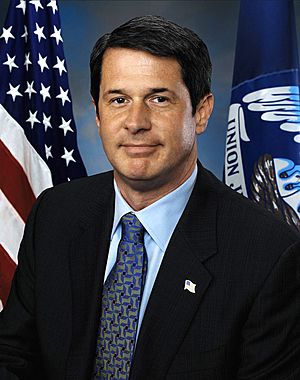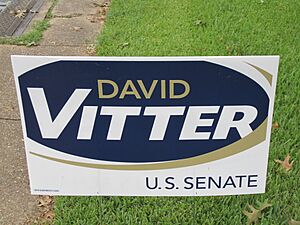David Vitter facts for kids
Quick facts for kids
David Vitter
|
|
|---|---|

Official portrait, 2005
|
|
| United States Senator from Louisiana |
|
| In office January 3, 2005 – January 3, 2017 |
|
| Preceded by | John Breaux |
| Succeeded by | John Kennedy |
| Chair of the Senate Small Business Committee | |
| In office January 3, 2015 – January 3, 2017 |
|
| Preceded by | Maria Cantwell |
| Succeeded by | Jim Risch |
| Member of the U.S. House of Representatives from Louisiana's 1st district |
|
| In office May 29, 1999 – January 3, 2005 |
|
| Preceded by | Bob Livingston |
| Succeeded by | Bobby Jindal |
| Member of the Louisiana House of Representatives from the 81st district |
|
| In office 1992–1999 |
|
| Preceded by | David Duke |
| Succeeded by | Jennifer Sneed Heebe |
| Personal details | |
| Born |
David Bruce Vitter
May 3, 1961 New Orleans, Louisiana, U.S. |
| Political party | Republican |
| Spouse |
Wendy Baldwin
(m. 1990) |
| Relations | Jeffrey Vitter (brother) |
| Children | 4 |
| Education | Harvard University (BA) Magdalen College, Oxford (BA) Tulane University (JD) |
| Signature | |
David Bruce Vitter (born May 3, 1961) is an American politician who was a United States Senator for Louisiana from 2005 to 2017. As a member of the Republican Party, Vitter also served in the Louisiana House of Representatives and the U.S. House of Representatives.
Vitter was first elected to the U.S. Senate in 2004. He was the first Republican to represent Louisiana in the Senate since the 1870s. In 2007, Vitter apologized for a serious personal mistake. Even so, he was re-elected to the Senate in 2010.
In 2015, Vitter ran for Governor of Louisiana. He lost the election to Democrat John Bel Edwards. After the election, Vitter announced he would not run for the Senate again in 2016. He retired from politics when his term ended. After leaving the Senate, Vitter began working as a lobbyist.
Contents
Early Life and Schooling

David Bruce Vitter was born in New Orleans, Louisiana. He graduated from De La Salle High School in 1979.
Vitter earned a bachelor's degree from Harvard College in 1983. He then studied at Magdalen College, Oxford in England as a Rhodes Scholar. In 1988, he received a law degree from Tulane University Law School. Before entering politics, he worked as a lawyer and taught law at Tulane and Loyola University New Orleans.
Vitter and his wife, Wendy, have four children. His brother, Jeffrey, is a computer scientist.
Early Political Career
Louisiana House of Representatives
Vitter was a member of the Louisiana House of Representatives from 1992 to 1999. While in the Louisiana Legislature, Vitter worked to change laws. He supported term limits, which set a maximum number of times a person can serve in an elected office. He helped pass a term limits amendment for the state constitution.
United States House of Representatives
In 1999, Vitter won a special election for Louisiana's 1st congressional district. He took the place of Republican U.S. Representative Bob Livingston. In the first round of voting, Vitter came in second. He then won the runoff election.
Vitter was re-elected in 2000 and 2002. He won with more than 80 percent of the votes. This showed that his district was strongly Republican. In 2003, Vitter suggested changing the U.S. Constitution. He wanted to ban same-sex marriage.
United States Senate
How He Was Elected
In 2004, Vitter ran for the U.S. Senate to replace Democrat John Breaux. He won the election with a majority of the vote. This made him the first Republican from Louisiana to be elected to the Senate by a popular vote of the people.
In 2010, Vitter ran for re-election. He faced Democratic U.S. Representative Charlie Melançon. Vitter won the election with about 57% of the vote and served a second term.
Work in the Senate
Vitter was known as a political conservative. He supported gun rights and a balanced budget. .....
After losing the governor's race in 2015, Vitter announced he would retire from the Senate at the end of his term in 2017.
Chemical Safety Laws
In 2016, Vitter helped pass a major law to reform how the country manages chemical safety. He called it a "big accomplishment" because it updated a law that both environmental groups and industry leaders agreed needed to be changed.
Immigration Policies
Vitter was very involved in debates about illegal immigration. In 2007, he helped block a major immigration reform bill. The bill would have created a path for many undocumented immigrants to gain legal status. Vitter argued that the bill was a form of amnesty, or a pardon for breaking the law.
He also proposed an amendment to the U.S. Constitution. It would change the rule that grants citizenship to anyone born in the United States. Under his proposal, a child would only be a citizen if at least one parent was a citizen, a legal resident, or serving in the military.
Gun Rights
Vitter was a strong supporter of gun rights. In 2006, he sponsored a law to stop the government from taking away legally owned guns during a disaster like a hurricane. The law passed and was signed by the president.
In 2013, he voted against a proposal to expand background checks for buying guns at gun shows and online. The proposal did not get enough votes to pass.
2015 Run for Governor
In 2014, Vitter announced he would run for governor of Louisiana. The current governor, Bobby Jindal, could not run again because of term limits.
Vitter's main opponent was Democrat John Bel Edwards. In the final election, Edwards defeated Vitter, winning 56% of the vote to Vitter's 44%.
Career After the Senate
After his Senate term ended in 2017, Vitter became a lobbyist in Washington, D.C. Lobbyists are people who are paid to influence government decisions. He has worked for several companies and foreign governments.
 | Precious Adams |
 | Lauren Anderson |
 | Janet Collins |


